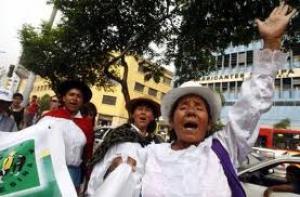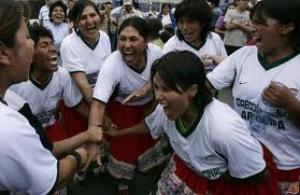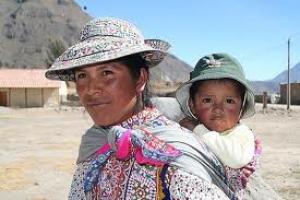PROMOTION OF WOMEN IN RURAL AREAS

We Sisters of the Holy Family, in collaboration with the sisters of St. Vincent and the local clergy are engaged in pastoral work in the districts of Cáceres of Perú-Jimbe, Moro and Pamparomás in the department of Ancash in the upper Andes. Given the situation of discrimination suffered by women in the area we took the decision on September 2010 to begin a Project designed to promote women in rural areas especially those living in the villages situated from 1200 to 4000 metres above sea level. There are about 30 communities in each district. We had been preparing this project for about 4 months by running workshops where the leaders of each parish actively participated. They undertook an analysis of their reality, looking for the causes of their situation, formulating proposals of solutions in a series of formation workshops and liberating actions. Eventually we arrived at a formulation of what we wished to do in the project:
“The Formation of women in the districts of Cáceres del Perú, Moro and Pamparomás in the department of Ancash, a formation aimed at sustainable human development and growth in autonomy. |
Presentation of the situation: description of the problem.
 In order to achieve sustainable development in a locality, the participation of women is essential. Therefore women must be in conditions of equality with men so that they can participate actively at all levels – family, community and at the level of the district. However we realise that the situation of women is far from ideal and we enumerate the problematic situations which impede the development of the Andean woman. In order to achieve sustainable development in a locality, the participation of women is essential. Therefore women must be in conditions of equality with men so that they can participate actively at all levels – family, community and at the level of the district. However we realise that the situation of women is far from ideal and we enumerate the problematic situations which impede the development of the Andean woman.
] The women in our districts are not aware of their rights, or the rights of their children. They are discriminated against because of their gender. There are high levels of machismo in families, in communities, especially on the part of the authorities.
] Women’s low self-esteem prevents them from expressing their feelings, desires and needs, as women, mothers, wives and citizens.
] There are high levels of domestic violence which is usually hidden and so women have very little protection.
] Many women have never completed primary education and many are illiterate.
] There is a lack of attention to reproductive and mental health.
] There is a lack of knowledge of nutrition especially in the care of their children’s health.
] There are great inequalities between the genders when it comes to participation in public affairs. Women are little prepared to make decisions and few exercise any role in the community and in the district.
] Women have few economic resources and suffer from poverty more than men. They lack the means to become economically independent and the majority depend financially on their spouses.
] They have the feeling also that in the sight of God they are second class beings and their female bodily and maternal functions make them impure.
] The majority of women have potential for leadership which remains dormant.
On completing this analysis, we were able to formulate the main objective of the project:
“To empower the women of the districts of the upper Andes, to improve the quality of their family life so that they can make a contribution in the management of local affairs for full human and sustainable development” |
Three main lines of action were proposed:
1. Integral human formation through organising workshops on self-esteem, rural culture, prevention of domestic violence, conflict management, equality of the sexes, reproductive and mental health.
2. Awareness of human rights and of their capacity for democratic leadership through organising workshops on the rights of women, participation as citizens, the responsibilities and functions of popular organisations, analysis of local and national reality and the place of politics.
3. Training in how to contribute to the economic development of their families and communities through courses on how to improve their conditions in life, self-financing through the rearing of domestic animals, learning new techniques of production and looking for ways of initiating new practices.
Our hope is that women may feel more valued and liberated as women, spouses, mothers and citizens; more motivated to contribute to public organisations, more prepared to exercise democratic leadership and more empowered to improve the economic situation in their households.

|